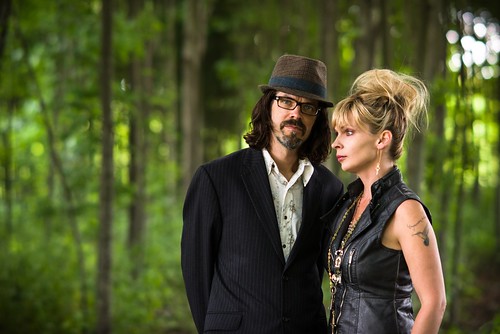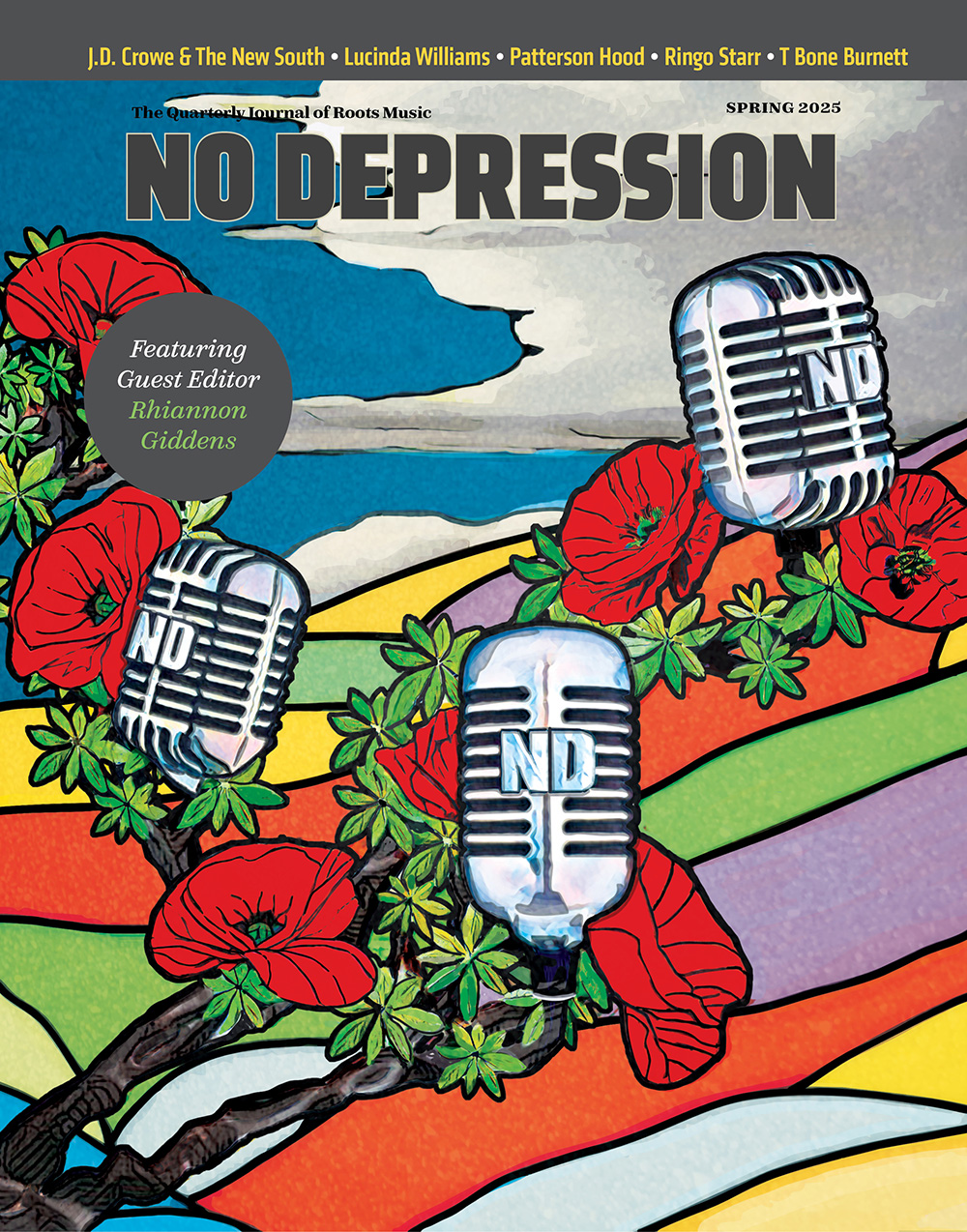Going 2-on-1 With Over the Rhine’s Linford Detweiler and Karin Bergquist
There are a lot of terrifically talented and youthful singer-songwriting couples today who, when they’re not making out, breaking up or making up, are capable of making beautiful music together.
Now all of them should listen up, especially if they aspire to reach the level of Linford Detweiler and Karin Bergquist, a perfect match of team players who are complementary and complimentary.
The affable husband-and-wife tandem that comprises Midwestern roots act Over the Rhine not only has a luscious new double album worth hearing called Meet Me at the Edge of the World, but also possesses the wisdom enhanced by a cemented relationship that’s as rich and rare as a Stradivarius violin.
Talking on separate lines, Detweiler and Bergquist seemed to be in tune with each other over most matters during a phone interview last week ahead of the September 3 release of Meet Me at the Edge of the World. The 12th studio album of their prolific career dating to 1989 contains 19 songs, lyrics and liner notes, numerous photos, a separate booklet listing the executive producers and “additional co-conspirators, allies and guardian angels” who helped fund the self-released project without the aid of a middleman.
Told that the industry doesn’t make them like that anymore, they both laughed. “Well, that’s one advantage to running your own label (Great Speckled Dog). You can do whatever you want,” Bergquist said, finding joy on a somber day of grieving for both of them after hearing the news that Dave Foreman, their “old musical friend” and “one-of-a-kind” front of house engineer for years known as “Juicy,” had died the previous night.
Reserving a place in their hearts for Juicy, the Over the Rhine duo managed to keep it together and changed the mood with lighthearted banter. With to-and-fro flow, they rarely interrupted each other, covering a number of subjects, from meeting for the first time to making the record with a title that, Detweiler said, serves as “kind of an invitation” to the tranquility they’ve found.
During a rough time for the music business, “It feels a little bit subversive to put together a package like that in 2013,” said Detweiler, often the Straight Man to Bergquist’s Funny Woman.
“It does feel good to be two decades in and to have enough material for a double album, though,” he later added. “It feels like a fertile period. I think a lot of attention, maybe rightfully so, I don’t know, is focused on young up-and-coming bands or singer-songwriters. Their first couple records tend to get a lot of attention. And we were beneficiaries of that when we first started out. There was some buzz around the band and we were new but …. It’s kind of like the same thing with relationships. That falling-in-love phase is exciting and it is a buzz, you know. But what happens further down the road I think is interesting, too.”
The band formed in 1989 after both were out of college. Bergquist remembers going back to school to perform a French duet (“Puccini, I think”) with a friend. Detweiler, a former fellow music student who then was commuting between Cincinnati and Canton, Ohio, attended the recital and all he needed was a lead singer to fill out his quartet. So he presented a proposal that had an engaging ring to it. The bachelorette somehow knew it was coming.
Bergquist: “He said, ‘Would you like to be in a …’ And before he could finish the sentence, I said, ‘Yes.’ And he says I’ve been completing his sentences ever since.”
There was no wedding attached to this band, but Bergquist packed her bags and “went sight unseen to Cincinnati” as the two co-founding members of Over the Rhine maintained strictly a professional relationship. That was until “we realized we had a good thing going musically, and that got us into trouble,” Detweiler said.
With such a wealth of experiences to draw from (they married in 1996), the pair did find a new source of inspiration when they left the urban life (including Cincinnati’s Over-the-Rhine neighborhood, then nearby Norwood) behind and bought what they like to call “a little farm” in Southern Ohio eight years ago.
After years of endless touring, “We wanted something rural, a place where we could recover with some quiet,” Bergquist said. “And no car alarms, you know. We would rather hear the birds in the morning. And so I said something I think along those lines to my better half. …
“And so he took a drive. I think he heard that and I think agreed. We just felt like it was the beginning of a new chapter when he found this old farmhouse (built in 1833). And we both just knew that that’s where we should be next and surrendered to it. And it was a very big change for us. We call it Nowhere Farm or Now Here Farm, depending on how you adapt.”
Whichever way they view it, the move did affect their songwriting, Bergquist said, as they discovered the names of the birds, old trees, wildflowers and weeds that they spend time with as constant gardeners down on The Farm, which was the album’s original working title.

The title cut started a theme that carries through Side 2, which includes “All Over Ohio,” Detweiler’s lovely love letter to their home state (he brings folksy charm to a rare co-lead vocal) and “Against the Grain,” Bergquist’s touching tribute to her late father-in-law.
“ ‘Against the Grain’ kind of decided it needed to be finished for this project. And that was really nice because it was about Linford’s dad,” said Bergquist, whom Detweiler called “quite the ninth-inning hitter” for her ability to step up to the plate and, with her 1932 Epiphone tenor guitar, drive home remarkable songs that she colorfully suggested raise their hand at the last minute.
“My father was a bit of a birdwatcher and when he saw the place he said he was hearing birds that he hadn’t heard since he was a boy growing up on his family farm,” Detweiler said. “And he had a bit of advice for us. He encouraged Karin and I to ‘leave the edges wild.’ That line crept into three different songs on the record and became kind of an important metaphor for us.”
“Don’t Let the Bastards Get You Down,” the Side 1 Bergquist song that features harmonies by the great Aimee Mann, might not seem to fit into such a peaceful, pastoral setting, but it has everything to do with her past life.
After moving from Phoenix with her mother and grandmother at the age of 7, Bergquist was raised in Barnesville, a small coal-mining, farming community on the eastern edge of Ohio near the West Virginia border. She remembers the abrupt change, turning off Interstate 70 and heading south down Route 800.
“And the first thing we saw were these strip mine hills. And I couldn’t really understand why they were strip mining these hills,” Bergquist said. “And it was for coal. And that became an introduction to me, for me, to this culture of coal mining and what families give up to have a living in these parts of Ohio and West Virginia. And it affected me deeply, as it turns out. And that song, as are a couple of the other songs on the record, like ‘Sacred Ground’ (cowritten with Detweiler, who grew up in Fairpoint, which has similar qualities), are both mine and Linford’s reflections on living in coal-mining country and what that looks and feels like from the ground up.”
Blessed with a beautiful set of pipes that can bring power or poignancy, Bergquist said she enjoys singing with other performers like Mann. But their initial connection was made as actors in Pleased to Meet Me, a feature film co-produced and cowritten by Dave Henry, the brother of Joe Henry, a Grammy Award winner who also produced Over the Rhine’s The Long Surrender in 2011.
“Joe Henry gets me involved in things sometimes because it’s hard to say no to Joe. Linford and I both have found a real brother in him. He’s such a wonderful ally,” Bergquist said of agreeing to her first major movie role (a comic part) with an intriguing cast of characters that also includes musical heavyweights John Doe and Loudon Wainwright III.
“I don’t consider myself an actress, but I had a blast and I got to meet and hang out with Aimee Mann and just loved her,” she added about the wry performer who, according to Detweiler, predicted a “straight to YouTube” future for the film. “I thought it would be kind of fun to hear Aimee sing on that song, ‘Don’t Let the Bastards Get You Down,’ because I thought it’s certainly a theme I felt like she could sink her teeth into, and she certainly did.”
Of course, Meet Me at the Edge of the World, with first-class contributions from Eric Heywood (guitars/pedal steel), Jennifer Condos (bass) and Jay Bellerose (drums), gave Bergquist and her everyday piano- and guitar-playing partner a chance to put the do in duet.
“Karin and I are singing more harmony together and sort of putting the two voices together,” Detweiler said. “I’d like to say I married a small-town girl with a big voice and for a long time I was pretty happy just to stay out of the way. … It feels a little bit like we started a new band, now that we’re singing together more.”
Hearing their two voices in unison for the first time on songs such as “Blue Jean Sky” — “It’s like two people hiding behind a tree and then one person kind of peeks out just a little bit,” Bergquist explained — surprised them both because they pulled off such a difficult, simultaneous action.
Bergquist, who said, “I hate to use the word, but I’ve been nagging him for a long time to sing with me,” couldn’t wait for the opportunity.
“I get tired of hearing myself. I love hearing him sing with me. It’s really inspiring and it just feels right,” she said, remembering how much she adored as a child those dates with her grandfather in front of the TV watching Hee Haw. (“That’s where Linford says I gleaned my comic genius,” was her line that did get a big laugh out of Detweiler.)
“But I loved those songs, real classic country,” she continued. “I loved the duets, I loved Buck Owens and Roy Clark. I’ve always loved that music. I didn’t really know what to do with it in the ’80s when we started the band. I didn’t know where I fit musically because I had this strange amalgam of all these musical influences,” including gospel.
After meeting Detweiler, her musical direction was mapped out — eventually.
The convivial couple was game for almost anything during the course of this interview. They’ve probably told the story of their introduction to each other a thousand times, but brought such panache to Instant Replay 1,001 that they sounded like enthusiastic colleagues in a broadcast booth covering their first game. Or teammates smelling paydirt.
Just don’t expect the 1-2 punch that appreciates an occasional sports analogy to make it quick. The two-minute drill doesn’t exist in their playbook.
Karin: “Quick? We don’t do anything quick.” (both laugh)
Linford: “We’ve mastered the art of the long answer.”
Time to huddle up.
Setting the scene, they were enrolled (he was a junior, she was a freshman, they think) at Malone College (now University), a little Quaker liberal arts school in the northeast Ohio town of Canton, “and it was very rock ‘n’ roll, I assure you,” Detweiler said, somehow failing to mention that it’s about a mile from the Pro Football Hall of Fame.
Detweiler takes the ball and runs with it.
“We had an old barn on campus that had been restored into the student center,” he said. “And I saw her sitting there and thought, ‘Oh, that’s a lovely face. I should go introduce myself.’ And I did — and Karin has no memory whatsoever of that first meeting. So that’s the kind of impact I was having …”
Bergquist laughs, then scoops up the lateral.
“It is absolutely true,” she said. “But that’s Part A. Part B of the story is that I did recognize him when I did see him in his true self for the first time. He was playing piano. He was a piano student. … And he was performing, and I believe it was a Ravel piece. And there were plenty of students playing their recitals and their performance pieces, but there was something different about him and there was something different about the way he was playing this Ravel piece and it really caught my ear. And I knew at that moment that he had something that resonated with me.”
Wondering if they shared musical interests, Bergquist handed off a cassette of R.E.M.’s Document to Detweiler. The play/ploy might have worked, but there was still a lot of ground to cover.
“It took us years and years before we realized that we had the tools to make a relationship,” Bergquist said. “Because I think we were both scared to death, honestly, after that. But when I did recognize him, when I saw him, I saw him for who he was, and I’ll never forget it.”
Touchdown!

Linford: “Karin used to always encourage couples to fight naked.”
Karin: “It’s a win-win situation. You’re either gonna get distracted and forget about what you were fighting about or you’re gonna laugh so hard that it’s not gonna matter.” (laughs)
They manage to find other ways to deal their issues.
Making a double album for the first time since 2003’s groundbreaking Ohio was done out of necessity because, Bergquist cracked, “We didn’t want to fight over whose songs we’re gonna make the record.”
Along with sharing songwriting credits, though (for the record: eight by Detweiler, including two brief instrumentals; five by Bergquist; five were cowritten; and a cover of The Band’s “It Makes No Difference”), they’re two of a kind that are almost too good to be true (see Faceoff below).
“We’ve figured out how to make it work,” Detweiler said. “It’s not for the faint of heart but it’s something that we feel really good about at this point.”
“I loved the idea of making music with your partner,” Bergquist said, admiring the chemistry of Johnny and June, who they sweetly reference in “Earthbound Love Song.”
“And I came from a broken home, so I didn’t even know what a good marriage really was supposed to look like,” she added. “That part was a lot harder. If you think the music industry’s hard, well, you know … (laughs) mix it with a relationship like this. But we learned early on that it’s like having two gardens. … They’re connected, but they’re separate. We have to water them and tend them with just as much care. And you can’t let one go without, or they’ll suffer.”
So tender and at ease with each other, they should be a true blueprint for any duo with designs on a healthy relationship, working or otherwise.
Solving other musical couples’ problems isn’t their business, but Detweiler wants to help. He passed along the profound message delivered in a Tony Bennett interview “where he was talking about young performers or young artists should not be encouraged to focus on getting famous quickly. What they should focus on is longevity. And anything you do that compromises your ability to practice a craft over the long haul, Tony referred to that as ‘Sinning against your talent.’
“And, you know, nobody expects bands to stay together forever. But when there’s a huge emphasis put on selling a lot of records quickly, that leads to a whole list of problems.”
Bergquist’s advice is just as powerful: “You don’t want to say things that you can’t take back. If you’re gonna fight dirty with anybody in life, it’s not worth it. You can’t take it back. Words are important. And I always like that about Linford. Words have always been important to him and I’ve learned from him about that, and so it just makes you careful about the words that you choose.”
Regarding their situation, it seems like old times for Detweiler and Bergquist, the witty and wise musical equivalent of Nichols and May or Stiller and Meara.
Detweiler makes the call:
“Even if we’re pissed, we kind of secretly want to know … ”
On the receiving end, Bergquist knows how to finish:
“… how the other person feels.”
With another successful completion, it looks like Over the Rhine will keep playing to win.
FACEOFF: OVER THE RHINE
Linford Detweiler and Karin Bergquist go head-to-head in deciding who’s better at these everyday tasks:

Karin: Linford is better because I’m a better navigator.
Linford: Agreed.
Housecleaning?
Linford: I’m better with the dishes, Karin’s better with the vacuum cleaner.
Karin: Yep, agreed.

Linford: Karin.
Karin: Yes, but Linford’s good, too. He has some things that he can cook that I just love. So he pitches in.
Linford: I can bake a chicken and some root vegetables. I can do some damage there. I have a limited repertoire.
Gardening?
Linford: Oooh.
Karin: Linford is much better with the vegetables. He’s a wonderful gardener, and I’m better with the flowers, the flower bed.
Linford: And the perennials. I’m the tree guy and the vegetable guy and Karin is the flowers and perennials.
Taking out the garbage?
Linford: Taking out the garbage. That’s a tie.
Karin: It’s a tie but I probably nag him more to do it. (laughs)

Karin: Oh, I do that more now.
Linford: Yeah, Karin’s better.
Karin: He used to but we’re in a season where I’m doing it more, which is fine. We have a 130-pound Great Dane puppy and I have a little more patience for her right now.

Karin: Oh. Who’s better?
Linford: I’m a lot better at that. (both laugh) Definitely I’m a lot better at that.
Karin: Yeah, yeah. He’s better at admitting he’s wrong, but he’s wrong more often.
Linford: Here’s some advice for the young lovers out there. Karin’s three favorite words — “You were right.”
Karin: Yes, it’s true.
Linford: She’s doesn’t like to say them, she likes to hear them. Not part of her vocabulary though.
Concert photo by Michael Bialas. Publicity photos by Darrin Ballman.





